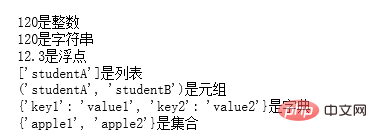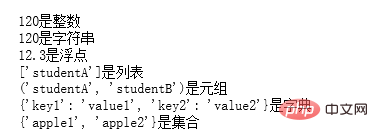您现在的位置是:课程教程文章
python如何判断数据类型是不是字典
2023-12-18 21:35课程教程文章 人已围观

Oracle 11G数据库从入门到精通/安装/表空间
Oracle 11G数据库从入门到精通/安装/表空间课程目标 带你走进Oracle的大门,本课程以接地气的语言来讲解,让你听的懂,...
Java零基础到入门系列:数据类型
Java零基础到入门系列:数据类型适合人群: 适合0基础人群 课程描述: 本课程讲解Java中的数据类型,了解标识...
揭秘 MySQL 的数据类型
揭秘 MySQL 的数据类型本次直播课程将邀请到腾讯云数据库产品团队的主要技术负责人 summerdliu(迪...
安为霞带你学python(三)——组合数据类型
安为霞带你学python(三)——组合数据类型课程目标:理解集合、元组、列表和字典的概念 熟练创建集合、元组、列表和...

python的数据类型有:数字(int)、浮点(float)、字符串(str),列表(list)、元组(tuple)、字典(dict)、集合(set)。
python学习网,大量的免费python视频教程,欢迎在线学习!
一般通过以下方法进行判断:
1、isinstance(参数1,参数2)
描述:该函数用来判断一个变量(参数1)是否是已知的变量类型(参数2) 类似于type()
参数1:变量
参数2:可以是直接或间接类名、基本类型或者由它们组成的元组。
返回值: 如果对象的类型与参数二的类型(classinfo)相同则返回True,否则返回False。
例子:
#判断变量类型的函数
def typeof(variate):
type=None
if isinstance(variate,int):
type = "int"
elif isinstance(variate,str):
type = "str"
elif isinstance(variate,float):
type = "float"
elif isinstance(variate,list):
type = "list"
elif isinstance(variate,tuple):
type = "tuple"
elif isinstance(variate,dict):
type = "dict"
elif isinstance(variate,set):
type = "set"
return type
# 返回变量类型
def getType(variate):
arr = {"int":"整数","float":"浮点","str":"字符串","list":"列表","tuple":"元组","dict":"字典","set":"集合"}
vartype = typeof(variate)
if not (vartype in arr):
return "未知类型"
return arr[vartype]
#判断变量是否为整数
money=120
print("{0}是{1}".format(money,getType(money)))
#判断变量是否为字符串
money="120"
print("{0}是{1}".format(money,getType(money)))
money=12.3
print("{0}是{1}".format(money,getType(money)))
#判断变量是否为列表
students=['studentA']
print("{0}是{1}".format(students,getType(students)))
#判断变量是否为元组
students=('studentA','studentB')
print("{0}是{1}".format(students,getType(students)))
#判断变量是否为字典
dictory={"key1":"value1","key2":"value2"}
print("{0}是{1}".format(dictory,getType(dictory)))
#判断变量是否为集合
apple={"apple1","apple2"}
print("{0}是{1}".format(apple,getType(apple)))返回:

2、通过与已知类型的常量进行比较
例子:
#判断变量类型的函数
def typeof(variate):
type1 = ""
if type(variate) == type(1):
type1 = "int"
elif type(variate) == type("str"):
type1 = "str"
elif type(variate) == type(12.3):
type1 = "float"
elif type(variate) == type([1]):
type1 = "list"
elif type(variate) == type(()):
type1 = "tuple"
elif type(variate) == type({"key1":"123"}):
type1 = "dict"
elif type(variate) == type({"key1"}):
type1 = "set"
return type1
#返回变量类型
def getType(variate):
arr = {"int":"整数","float":"浮点","str":"字符串","list":"列表","tuple":"元组","dict":"字典","set":"集合"}
vartype = typeof(variate)
if not (vartype in arr):
return "未知类型"
return arr[vartype]
#判断变量是否为整数
money=120
print("{0}是{1}".format(money,getType(money)))
#判断变量是否为字符串
money="120"
print("{0}是{1}".format(money,getType(money)))
money=12.3
print("{0}是{1}".format(money,getType(money)))
#判断变量是否为列表
students=['studentA']
print("{0}是{1}".format(students,getType(students)))
#判断变量是否为元组
students=('studentA','studentB')
print("{0}是{1}".format(students,getType(students)))
#判断变量是否为字典
dictory={"key1":"value1","key2":"value2"}
print("{0}是{1}".format(dictory,getType(dictory)))
#判断变量是否为集合
apple={"apple1","apple2"}
print("{0}是{1}".format(apple,getType(apple)))返回:

isinstance() 与 type() 区别:
type() 不会认为子类是一种父类类型,不考虑继承关系。
isinstance() 会认为子类是一种父类类型,考虑继承关系。
如果要判断两个类型是否相同推荐使用 isinstance()。
python学习网,免费的在线学习python平台,欢迎关注!
课程教程:python如何判断数据类型是不是字典上一篇:python如何统计分析
下一篇:没有了
